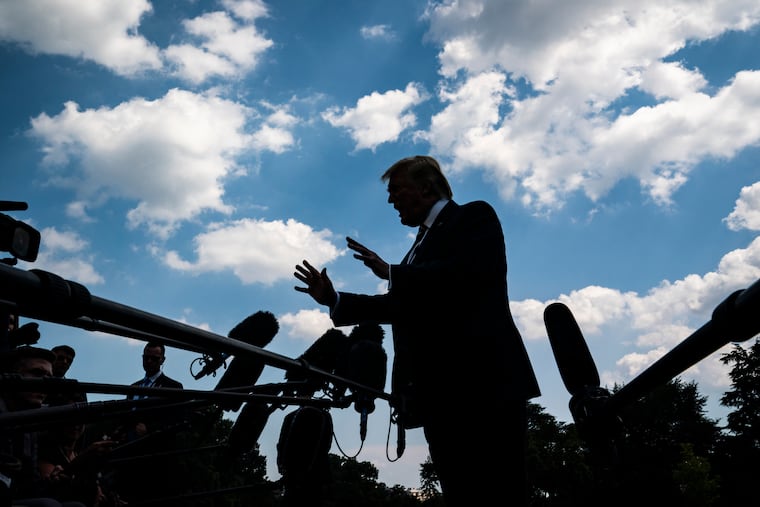How does the news really make us feel? This Penn expert looks at how it changes our habits.
“Some of these emotions actually lead to a more political participation, to wanting to do more.”

When speaking with dozens of participants in her study about how the news made them feel, María Celeste Wagner heard a lot.
“When we would inquire about these emotions, most of them were what we would typically describe as negative emotions like anxiety, certain distress, feeling overwhelmed,” Wagner explained. “A word that participants would use a lot was feeling ‘inundated’ by certain political news stories.”
Wagner, a doctoral candidate at Penn’s Annenberg School for Communication, conducted a series of 71 interviews during President Donald Trump’s first year in office. With Northwestern professor Pablo J. Boczkowski, their research, published last year in the journal Journalism, focused on the president more than they originally intended. Participants from the Philadelphia, Chicago, and Miami areas reacted strongly around Trump coverage, so they followed those responses. They found that it wasn’t always Trump’s tweets that upset their interviewees, but rather the conversations about Trump among the people they knew.
“What their friends or acquaintances or colleagues or relatives were saying [on] social media,” Wagner explained. “While remembering that experience, a lot of people would say, ‘Social media was too much.’ ‘I stopped using Facebook.’ ‘I was getting into too many arguments.’ ‘It was bad, bad for mental health.’”
The 71 participants ranged from 18 to 80 years old, the average age being 41. The majority were women.
Wagner, from Argentina, who received her received her undergraduate degree from the Universidad de San Andrés and published another study from interviews last year on fake news in digital journalism, was careful to point out that negative reactions didn’t mean less political engagement. “Some of these emotions actually lead to more political participation, to wanting to do more,” Wagner said.
We spoke to Wagner about how media can impact not only one’s feelings, but also one’s sense of democracy. The following has been edited and condensed for length and clarity.
On feeling upset, across party lines
We found that people who are liberal or identifying as Democrats would say that they were angry at the news about President Trump. More conservative or Republican interviewees would say that they were angry at the coverage that mainstream news media was making on President Trump. And in some cases, Democrats were also angry at the coverage — not on President Trump — but about the elections because they felt that they weren’t informed as well [through news coverage] as they could have been. So that’s something that’s a difference we found across the ideological spectrum: different participants expressing anger or a disappointment with the news media, related to different things, but a shared emotional experience.
On having a hard time emotionally with the news
Some people were saying that, OK, they realize that they have to consume news in a more sustainable way, because some news for certain groups are also hard to read. We had different interviewees that because of their own … experiences, because of what they do for their work, and other things, like immigration status, they were saying, “Reading the news is hard for me, and I need to know, and I want to be aware of what’s happening, but maybe I will do it in certain times of the day where I can cope with it.” Or “Maybe I will do it by talking to this person or by reading only this thing.”
On looking at the emotional side
Usually, in Western thought, the idea of democracy has always meant or has always implied that the citizenship as a body needs to be rational, which is an idea that we write in institutions, in scholarly work. Therefore, we always seek for objectivity, and try to reduce our biases, which are all good things, right? But at the same time ... the implication is always that we should try to leave our emotions aside and be rational.
We started to study emotions in a different way ... . We try to understand emotions not as a bad thing that prevents us from making good decisions, but as something that is inherent to how we think and operate in the world, and consume information and relate to other people, and make political decisions.
On finding balance with news consumption
Our own interviewees [detailed] several practices of self-preservation. It was this combination that could sound contradicting, but in their own accounts, it’s actually something that works together and happens at the same time. This idea of trying to self-preserve your own well-being, while at the same time feeling a sense of civic duty. That’s part of the democratic idea of participating and knowing what’s happening.
Some participants would say that they would try to be more mindful about when they consume news and try to reduce the time or be aware [when] they consume news so that it’s a more controlled practice.
On vetting fake news
Something interesting was that [participants] started to rely more on traditional fact-based media, and that there was this ... rejection of opinionated media and trying to just get the facts. Some people would tell us if I could read something that is just like bullet points, fact-based, like the things I need to know, I would read that.
There were other strategies that were a little bit more sophisticated and time-consuming. So not everyone can do this, right? You need to have the time and the resources, but a lot of people would say that they would seek for repetition of information across outlets ... . So that if they could confirm that that information was repeating itself in different news outlets and ideologically diverse news outlets, then they could say with more confidence, well, this, this is probably true.
Also some people would do fact-checking themselves.